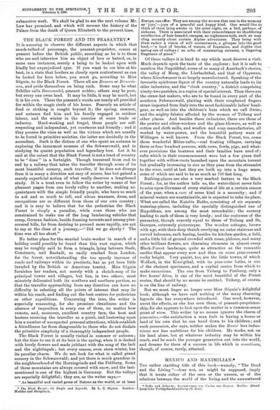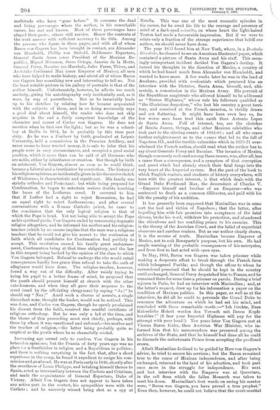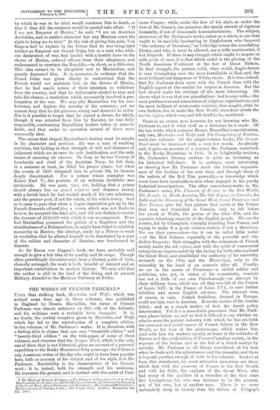MEXICO AND MAXIMILIAN.*
TIIE rather startling title of this book—namely, "The Dead and the Living "—does not, as might be supposed, imply that it treats either of the seen or the unseen, or of the relations between the world of the living and the unnumbered • Todte and Lebends ; Errinerungen ons Carlon von Gaiern. Berlin : Abend beim'ache Yerlspbuchbandlung (G. kal). and living personages whom the author, in his remarkable career, has met and known. Most of these personages have played their parts ; others still survive. Hence the contents of the work answer with sufficient accuracy to its title. Among the persons who figure in these pages, and with all of whom Baron von Gagern has been brought in contact, are Alexander von Humboldt, Phillip von Siebold, Baldomero Espartero, General Santa Anna (once President of the Mexican Re- public), Miguel Miramon, Jesns Ortega, Janvier de la Motte, General Forey, Bazaine (ex-Marshal), Jules Fevre, Thiers, and Archduke Ferdinand Max (once Emperor of Mexico), all men who have helped to make history, and about all of whom Baron von Gagern has something new and interesting to tell us. Not the least notable picture in his gallery of portraits is that of the author himself. Unfortunately, however, he affects too much modesty, giving his autobiography only incidentally and, as it were, by way of parenthesis. But as he invariably leads up to his sketches by relating how he became acquainted with the subjects of them, and in so doing necessarily says a good deal about himself, the reader who does not skip acquires in the end a fairly competent knowledge of the character and career of Carlos von Gagern. He does not mention when he first saw the light ; but as he was a school- boy at Berlin in 1831., he is probably by this time past sixty. As he was a Freiherr by birth, graduated at Leipsic University, held a commission in the Prussian Artillery, and never seems to have wanted money, it is safe to infer that his people were in easy circumstances, and occupied a good social position, which is more than can be said of all Germane who are noble, either by inheritance or creation. But though by birth an aristocrat, Von Gagern, almost as soon as he could think, became a Liberal and a freethinker by conviction. The history of his religious opinions, as incidentally given in his discursive sketch of Wislicenus, is characteristic and significant. His family was strictly orthodox and Protestant; but while being prepared for Confirmation, he began to entertain serious doubts touching the bases of the Lutheran creed. It occurred to him that if Luther had a right to reject Romanism, he had an equal right to reject Lutheranism ; and after several conversations with a R3man Catholic priest, he came to the conclusion that the only logical religion is that of which the Pope is head. Yet not being able to accept the Pope as his spiritual guide, Von Gagern ended by renouncing dogmatic religion altogether, and he informed his mother and his religion. teacher (which by no means implies that the man was a religions teacher) that he could not give his assent to the confession of faith which all candidates for Confirmation had publicly to accept. This resolution caused his family great embarrass- ment, Confirmation being at that time obligatory, and the law in this respect being backed by the opinion of the class to which Von Gagern belonged. Refusal to undergo the rite would entail consequences hardly less grave than refusal to take the oath of allegiance would have done. The religion-teacher, however, found a way out of the difficulty. After vainly trying to bring his pupil to a better frame of mind, he proposed that the youth should present himself at church with the other catechumens, and when they all gave their response to the creed (read by the officiating clergyman) by saying " J a !" he should say " Naa !" Amid such a chorus of assents, a single discordant note, thought the leader, would not be noticed. This
was done, and Carlos von Gagern, though be openly proclaimed his dissent from the faith, received the needful certificate of religious orthodoxy. But he was only a lad at the time, and the blame of this proceeding must rest chiefly, perhaps, with those by whom it was sanctioned and enforced,—his mother and the teacher of religion,—the latter being probably quite as sceptical as the youth whom he so shamefully misled.
Increasing age served only to confirm Von Gagern in his to dissuade the unfortunate Prince from accepting the proffered heterodox opinions; but the Pruesia of forty years ago was no crown. It has generally been supposed that Maximilian was in some sort the tool and victim of Napoleon ; that the latter, after beguiling him with fair promises into acceptance of the fatal throne, broke his word, withdrew his protection, and abandoned the chivalrous and too confiding prince to his enemies. This is the theory of the Austrian Court, and the belief of superficial observers and careless readers. But as our author clearly shows, it is the reverse of truth. Maximilian became Emperor of Mexico, not to suit Bonaparte's purpose, but his own. He had ample warning of the probable consequences of his enterprise, and from first to last acted with open eyes.
In May, 1863, Baron von Gagern was taken prisoner while making a desperate effort to break through the French force which beleagured Puebla; and though the officer to whom he surrendered promised that he should be kept in the country until exchanged, General Foray despatched him to France, and he remained there for some time a prisoner on parole. During a brief sojourn in Paris, he had an interview with Maximilian ; and, at the latter's request, drew up for his information a paper on the condition of Mexican politics. In this paper, as well as at the interview, he did all he could to persuade the Grand Duke to renounce the adventure on which he had set his mind, and concluded with these remarkable words :—" Ich ffirchte, Ewe Kaiserliche Hoheit werden den Versuch mit Ihrem Kopfe bezahlen !" (I fear your Imperial Highness will pay for the attempt with your head !) Ten years later Von Gagern met at Vienna Baron Kuhn, then Austrian War Minister, who in- formed him that his memorandum was preserved among the archives of the State, and that he himself had done all he could
multitude who have "gone before." It concerns the dead Estella. This was one of the most romantic episodes in his career, for he owed his life to the courage and presence of mind of a dark.eyed senorita, on whose heart the light-haired Teuton had made a favourable impression. But if we were to relate only a fraction of the strange experiences that befell our author, we should never have done.
The year 1853 found him at New York, where, in a Deutsche Bierstubc, he chanced to see an American illustrated paper, which contained a picture of Santa Anna and his staff. This seem- ingly unimportant incident decided Von Gagern's destiny. It turned his thoughts in the direction of Mexico, a country of which he had heard much from Alexander von Humboldt, and wanted to know more. A few weeks later he was in the land of Anahnac, provided with credentials which procured him an interview with the Dictator, Santa Anna, himself, and, ulti- mately, a commission in the Mexican Army. His portrait of the Republican magistrate who allowed himself to be addressed as "Serene Highness," whose rule his followers qualified as "the illustrious despotism," who lost his country a great terri- tory, and connived at the French invasion, is vividly drawn and not flattering. It might have been even less so, for few worse men have trod this earth than Antonio Lopez de Santa Anna. Full of interest, too, are the sketches of Benito Juarez, Ortega, and other Mexican celebrities who took part in the stirring events of 1862-66 ; and all who crave further enlightenment as to the citifies that led to the fall of Napoleon III., and the terrible calamities which in 1870-71 over- whelmed the French nation, should read what the author has to say about Generals Forey and Bazaine. The invasion of Mexico, though commonly reckoned among these causes, was, after all, less a cause than a consequence, and a symptom of that corruption and greed which had already struck their fatal fangs into the very heart of the Imperial system. But the part of the book to which English readers, and students of history everywhere, will turn with the greatest interest, is that which deals with the Grand Duke Ferdinand Max, the descendant of Charles V. —Emperor himself and brother of an Emperor—who was sentenced to death as• a common filibuster, and paid with his life the penalty of his ambition.
by which he was to be tried would condemn him to death, or that if they did the sentence would be carried into effect. "If I am not Emperor of Mexico," he said, "I am an Austrian Archduke, and in neither character has any Mexican court the right to bring me to trial." At the risk of giving him pain, Von Gagern had to explain to the Prince that he was being tried neither as Emperor nor Grand Duke, but as a man who, with- out declaration of war, had landed with a hostile force on the shores of Mexico, seduced officers from their allegiance, and endeavoured to overturn the Republic,—in short, as a filibuster. This idea seemed to be altogether new to Maximilian, and greatly depressed him. It is, moreover, in evidence that the Grand Duke was given clearly to understand that the French would not maintain him on the throne of Mexico, that he had ample notice of their intention to withdraw from the country, and that he deliberately elected to stay and take his chance, a resolution which necessarily involved a pro- longation of the war. We may pity Maximilian for his mis- fortunes, and deplore the severity of his sentence ; yet we cannot deny that he did grievous wrong and deserved to suffer.
Nor is it possible to forget that he signed a decree, for which, though it was extorted from him by Bazaine, he was fully responsible, condemning Republican leaders taken in arms to death, and that under its operation several of them were summarily shot.
The causes that shaped Maximilian's destiny must be sought in his character and position. He was a man of vaulting ambition, but lacking in that strength of will and clearness of judgment which are at once its sole justification, and the only means of ensuring its success. So long as be was Viceroy of Lombardy and chief of the Austrian Navy, he felt that, in a measure at least, he filled his proper place; but when the events of 1859 relegated him to private life, he became deeply discontented. For a prince whose exemplar was Kaiser Karl V., the position of an ordinary Archduke was intolerable. He was poor, too ; for, holding that a prince should always live en grand seigneur and dispense money with a lavish hand, he had wasted much of his own substance, and the greater part, if not the whole, of his wife's dowry. And so it came to pass that when a bogus deputation got up by the French Generals offered him a crown which was not theirs to bestow, he accepted the fatal gift, and did not disdain to receive the douceur of 2120,000 with which it was accompanied. Even had Maximilian possessed the genius of a Napoleon and the steadfastness of a Hohenzol:ern, he might have failed to establish monarchy in Mexico; the attempt, made by a Prince so weak in resolution that he allowed himself to be dominated by a man of the calibre and character of Bazaine, was foredoomed to disaster.
As for Baron von Gagern's book, we have probably said enough to give a fair idea of its quality and its scope. Though often provokingly discursive and, from a literary point of view, clumsily arranged, the work is both brimful of interest and an important contribution to modern history. We may add that the author is still in the land of the living, and at present Military Attache to the Mexican Embassy at Berlin.
















































 Previous page
Previous page